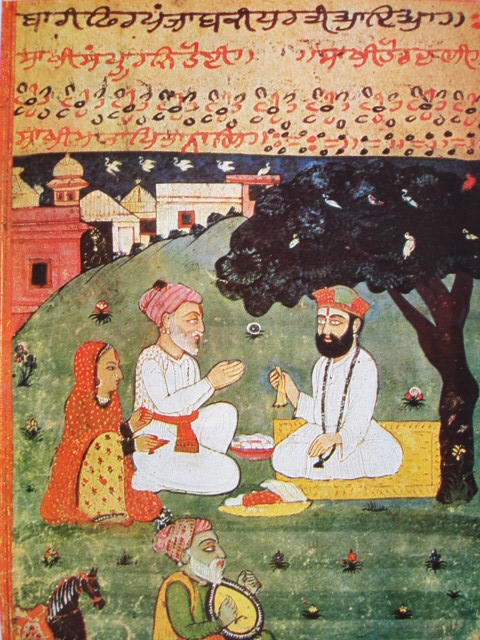AKUL, BHAI, a resident of Sultan pur Lodhi in present day Kapurthala district of the Punjab, embraced the Sikh faith in the time of Guru Amar Das. Bhai Gurdas in his Varan praises his sincerity and devotion to the Guru. Once Bhai Akul, along with several others from his village, waited on Guru Arjan and begged to be instructed in how sattvika gunas, or qualities of purity and goodness, might be cultivated.
BHAINI BAGHA, an old village 10 km north of the district town of Mansa (29° 59`N, 75° 23`E) in the Punjab, has a historical shrine, Gurdwara Rakabsar Patshahi Nauvlri. It is said that as Guru Tegh Bahadur was proceeding from Khiala towards Dikkh, a strap of the saddle stirrup, rakabin Punjabi, broke. He stopped to get the stirrup mended by the village cobbler. A memorial in the shape of a platform was raised to mark the spot where the Guru had alighted and sat. Later, a room was built by the side of the platform and the Guru Granth Sahib installed in it.
BUDDHA. BABA (1506-1631), a most venerated primal figure of early Sikhism, was born on 6 October 1506 at the village of Katthu Narigal, 18 km northeast of Amritsar (31° 36\'N, 74° 50\'E). Bura, as he was originally named, was the only son of Bhai Suggha, a Jatt of Randhava clan, and Man Gauran, born into a Sandhu family. As a small boy, he was one day grazing cattle outside the village when Guru Nanak happened to pass by. According to Bhai Mani Singh, Sikhan di Bhagat Mala, Bura went up to him and, making obeisance with a bowl of milk as his offering, prayed to him in this manner: "0 sustainer of the poor! I am fortunate to have had a sight of you today.
CHARAN SINGH, BHAI (1902-1921), son of Bhai Gurdit Singh and Mai Sada Kaur of the village of Kotla Santa Singh in Sheikhupura district, now in Pakistan, was born on 12 Maghar 1959 Bk/26 November 1902. His original name was Karnail Singh and he was renamed Charan Singh when he received the vows of the Khalsa. He attended the village primary school. He had a musical voice and got up a dhadi jatha (band of preachers singing heroic ballads from Sikh history to the accompaniment of small tambourines called dhads and a sarangi, a stringed instrument). He himself played the sarangi.
DHANNA SINGH (1888-1923). a Babar revolutiortary, was born at the village of Bahibalpur, in Hoshiarpur district. His father, Indar Singh, could barely afford to send him to the village primary school where Dhanna Singh learnt to read and write in Punjabi and Urdu. Early in his youth he was converted to radical politics by Kararn Singh, of Daulatpur, leader of the Chakravarti Jatha, and helped organize the Jathas major divans at Mahalpur (March 1921) and at Kukkar Muzara (October 1921). The Chakravarti Jathas of Kishan Singh Gargajj and Karam Singh merging together made up plans at a meeting at Jassoval on 25 December 1922 to maim, plunder or murder informers and helpers of the British government.






